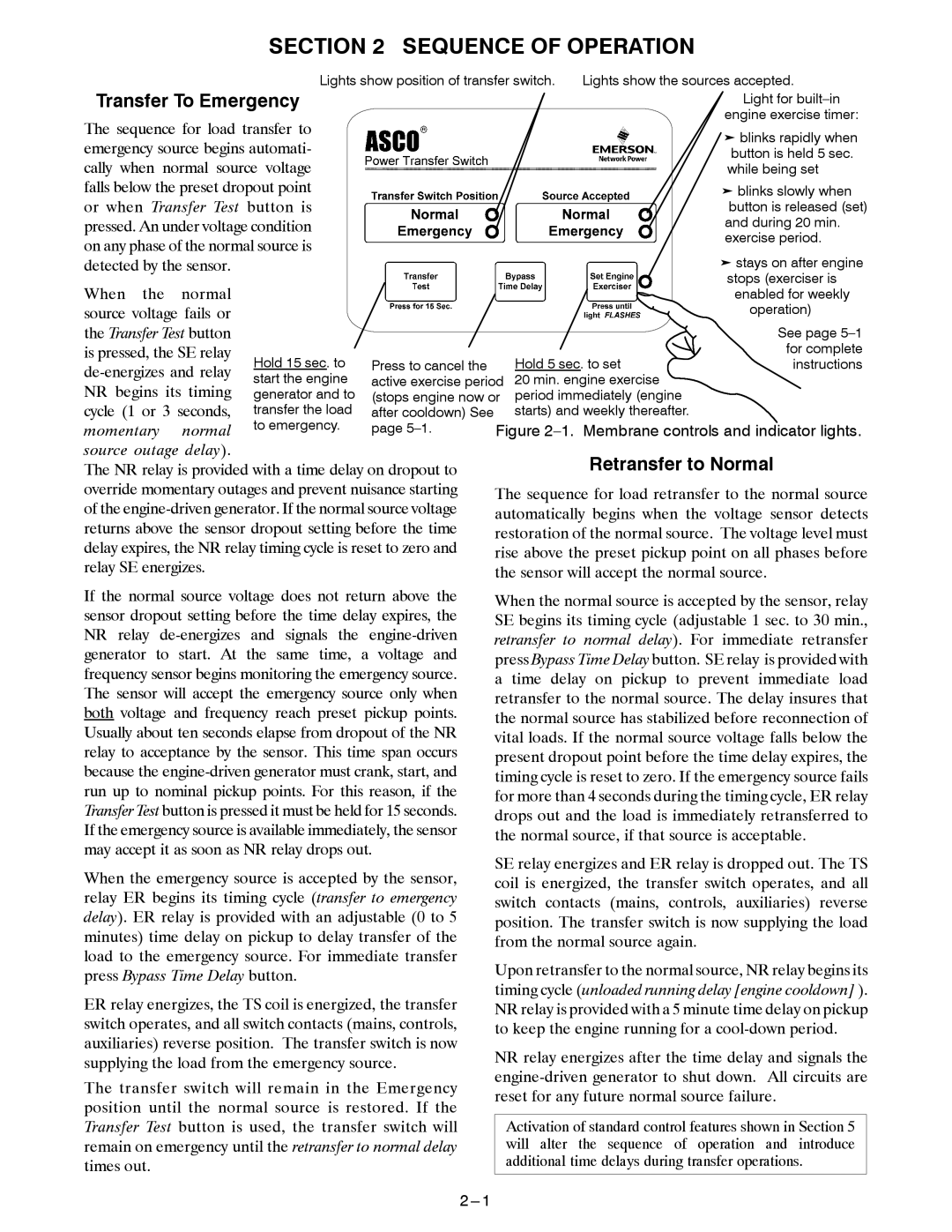Retransfer to Normal
The sequence for load retransfer to the normal source automatically begins when the voltage sensor detects restoration of the normal source. The voltage level must rise above the preset pickup point on all phases before the sensor will accept the normal source.
When the normal source is accepted by the sensor, relay SE begins its timing cycle (adjustable 1 sec. to 30 min., retransfer to normal delay). For immediate retransfer press Bypass Time Delay button. SE relay is provided with a time delay on pickup to prevent immediate load retransfer to the normal source. The delay insures that the normal source has stabilized before reconnection of vital loads. If the normal source voltage falls below the present dropout point before the time delay expires, the timing cycle is reset to zero. If the emergency source fails for more than 4 seconds during the timing cycle, ER relay drops out and the load is immediately retransferred to the normal source, if that source is acceptable.
SE relay energizes and ER relay is dropped out. The TS coil is energized, the transfer switch operates, and all switch contacts (mains, controls, auxiliaries) reverse position. The transfer switch is now supplying the load from the normal source again.
Upon retransfer to the normal source, NR relay begins its timing cycle (unloaded running delay [engine cooldown] ). NR relay is provided with a 5 minute time delay on pickup to keep the engine running for a cool-down period.
NR relay energizes after the time delay and signals the engine-driven generator to shut down. All circuits are reset for any future normal source failure.
Activation of standard control features shown in Section 5 will alter the sequence of operation and introduce additional time delays during transfer operations.
SECTION 2 SEQUENCE OF OPERATION
| | Lights show position of transfer switch. | Lights show the sources accepted. |
Transfer To Emergency | | | | | Light for built–in |
The sequence for load transfer to | | | | | engine exercise timer: |
| | | | ³ blinks rapidly when |
emergency source begins automati- | | | | |
| | | | button is held 5 sec. |
cally when normal source voltage | | | | | while being set |
falls below the preset dropout point | | | | | ³ blinks slowly when |
or when Transfer Test button is | | | | | button is released (set) |
pressed. An under voltage condition | | | | | and during 20 min. |
on any phase of the normal source is | | | | | exercise period. |
| | | | ³ stays on after engine |
detected by the sensor. | | | | | |
When the | normal | | | | | | stops (exerciser is |
| | | | | enabled for weekly |
source voltage fails or | | | | | | operation) |
the Transfer Test button | | | | | | See page 5–1 |
is pressed, the SE relay | Hold 15 sec. to | Press to cancel the | | Hold 5 sec. to set | for complete |
de-energizes and relay | | instructions |
start the engine | active exercise period | 20 min. engine exercise | |
NR begins its timing | |
generator and to | (stops engine now or | period immediately (engine | |
cycle (1 or 3 seconds, | transfer the load | after cooldown) See | | starts) and weekly thereafter. | |
momentary | normal | to emergency. | page 5–1. | Figure 2–1. Membrane controls and indicator lights. |
source outage delay).
The NR relay is provided with a time delay on dropout to override momentary outages and prevent nuisance starting of the engine-driven generator. If the normal source voltage returns above the sensor dropout setting before the time delay expires, the NR relay timing cycle is reset to zero and relay SE energizes.
If the normal source voltage does not return above the sensor dropout setting before the time delay expires, the NR relay de-energizes and signals the engine-driven generator to start. At the same time, a voltage and frequency sensor begins monitoring the emergency source. The sensor will accept the emergency source only when both voltage and frequency reach preset pickup points. Usually about ten seconds elapse from dropout of the NR relay to acceptance by the sensor. This time span occurs because the engine-driven generator must crank, start, and run up to nominal pickup points. For this reason, if the Transfer Test button is pressed it must be held for 15 seconds. If the emergency source is available immediately, the sensor may accept it as soon as NR relay drops out.
When the emergency source is accepted by the sensor, relay ER begins its timing cycle (transfer to emergency delay). ER relay is provided with an adjustable (0 to 5 minutes) time delay on pickup to delay transfer of the load to the emergency source. For immediate transfer press Bypass Time Delay button.
ER relay energizes, the TS coil is energized, the transfer switch operates, and all switch contacts (mains, controls, auxiliaries) reverse position. The transfer switch is now supplying the load from the emergency source.
The transfer switch will remain in the Emergency position until the normal source is restored. If the Transfer Test button is used, the transfer switch will remain on emergency until the retransfer to normal delay times out.
2---1

